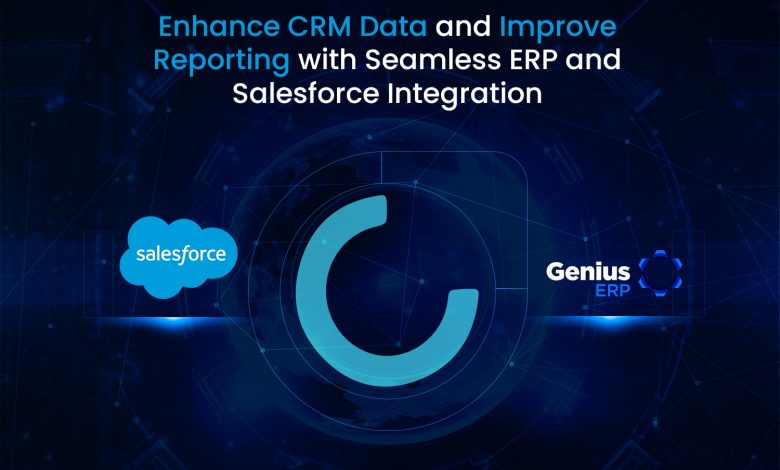Why Salesforce ERP Is the Future of Business Management

In an era dominated by technological advancements and growing customer expectations, businesses are under constant pressure to streamline operations, increase efficiency, and stay competitive. Enterprise Resource Planning (ERP) systems have long been at the heart of operational success for companies, providing a central platform for managing core business processes. However, traditional ERP systems often fall short when it comes to flexibility, scalability, and the ability to adapt to the fast-paced demands of modern business environments. This is where Salesforce ERP steps in, offering a cloud-integrated solution that is redefining how businesses manage their operations.
Salesforce ERP is more than just a system for managing resources; it is a comprehensive, dynamic tool that leverages the power of the cloud and integrates with Salesforce’s customer relationship management (CRM) capabilities to provide businesses with the tools they need to thrive in today’s digital world.
In this article, we will explore why Salesforce ERP is the future of business management, highlighting its key features, benefits, and how it addresses the challenges faced by modern businesses.
The Evolving Business Landscape
Before diving into why Salesforce ERP is the future, it’s important to understand the broader context in which modern businesses operate.
Growing Demand for Agility and Flexibility
The business world is no longer about slow, long-term growth strategies but about agility and adaptability. Companies are increasingly seeking systems that enable them to respond quickly to market changes, customer demands, and new technologies. This means that traditional, on-premise ERP solutions, which require long deployment times and heavy infrastructure, are becoming outdated. Salesforce ERP, built for the cloud, offers unparalleled flexibility, making it a perfect fit for organizations seeking to adapt to the modern business landscape.
The Need for Real-Time Data
In the past, decision-making was often delayed due to the time it took to gather and analyze data. With the rise of digital technologies, businesses are now expected to make decisions faster and more accurately. The demand for real-time data access is higher than ever, and companies need tools that can provide them with up-to-the-minute insights. Salesforce ERP integrates real-time data analytics across various business functions, helping organizations make informed decisions faster.
Integration and Collaboration
Modern enterprises are no longer just single entities operating in isolation; they are part of interconnected ecosystems involving customers, suppliers, and even competitors. As a result, business processes need to be more collaborative and integrated. Salesforce ERP allows for seamless integration with other Salesforce products, enhancing the collaboration between teams and departments.
Key Features of Salesforce ERP
Salesforce ERP is designed to meet the dynamic needs of modern businesses. Below are some of the standout features that make it the go-to ERP solution for future-focused enterprises.
Cloud-Based Flexibility
Salesforce ERP is built on a cloud platform, providing businesses with a range of advantages over traditional ERP systems.
Scalability
Cloud-based ERP solutions, like Salesforce, can scale easily to meet the needs of a growing business. As companies expand, they can add new users, features, and modules without the need for significant infrastructure upgrades. This scalability ensures that the system will evolve with the business over time.
Accessibility
One of the primary benefits of Salesforce ERP’s cloud architecture is accessibility. Whether your team is working remotely, in the office, or across multiple locations, they can access the system from anywhere at any time. This accessibility ensures that teams stay connected and can collaborate effectively regardless of location.
Integration with Salesforce CRM
Salesforce has long been a leader in customer relationship management (CRM), and the integration of ERP with CRM takes this a step further.
Unified Customer View
Salesforce ERP’s integration with Salesforce CRM allows businesses to view customer data in a unified platform. This means that sales, marketing, customer service, and finance departments can work with the same set of customer information, ensuring better communication and more efficient processes.
Enhanced Customer Experience
By connecting financial, operational, and customer-facing teams, Salesforce ERP helps deliver a seamless customer experience. Sales teams can track orders, update product availability in real time, and coordinate with support teams, all while keeping the customer informed about the status of their products or services.
Real-Time Analytics and Reporting
Real-time data is essential for making fast, informed decisions, and Salesforce ERP excels in this area.
AI-Powered Insights
Salesforce ERP utilizes artificial intelligence (AI) to analyze data and generate predictive insights. This empowers businesses to make data-driven decisions based on accurate, up-to-date information. The AI capabilities can help forecast demand, assess financial performance, and identify areas for improvement across departments.
Customizable Dashboards
The platform allows for customizable dashboards that provide real-time performance indicators and data visualizations. Managers and executives can access key metrics that matter to them, helping them monitor business health and performance from a centralized location.
Streamlined Business Processes
A significant advantage of implementing Salesforce ERP is its ability to streamline business operations by automating tasks and eliminating inefficiencies.
Automated Workflow
Salesforce ERP can automate repetitive tasks like invoicing, order processing, and data entry, allowing employees to focus on higher-value activities. This automation not only increases productivity but also reduces the likelihood of human error, improving overall operational accuracy.
Efficient Financial Management
Financial management is crucial to any business, and Salesforce ERP automates many of the processes involved in managing finances, from payroll and invoicing to budgeting and reporting. This automation reduces manual intervention, saving time and ensuring financial accuracy.
Benefits of Salesforce ERP for Businesses
Salesforce ERP brings numerous advantages to businesses, making it the ideal solution for modern enterprises. Below are some of the most notable benefits.
Cost Efficiency
Traditional ERP systems often come with high upfront costs, extensive installation processes, and ongoing maintenance fees. Salesforce ERP, being cloud-based, eliminates the need for costly hardware and infrastructure investments. Additionally, with its pay-as-you-go pricing model, businesses only pay for what they use, making it a cost-effective solution, particularly for smaller enterprises.
Enhanced Collaboration Across Teams
Salesforce ERP fosters collaboration by integrating various business functions into a single platform. Teams across departments – sales, marketing, finance, HR, and customer support – can share data, insights, and updates in real time, ensuring that everyone is on the same page. This cross-departmental collaboration leads to faster problem-solving and improved efficiency.
Better Decision-Making with Data
Salesforce ERP enables organizations to make better decisions by providing timely, data-driven insights. The real-time analytics and AI-powered tools ensure that managers and decision-makers have access to the information they need to drive strategic initiatives. This level of transparency allows for quicker adjustments to business strategies and the ability to seize emerging opportunities.
Scalability for Growing Businesses
As businesses grow, so do their needs. Salesforce ERP is built to scale, allowing organizations to add new users, features, and even custom applications to meet their evolving requirements. Whether you’re expanding into new markets or adding new product lines, Salesforce ERP grows with your business.
Improved Customer Satisfaction
Salesforce ERP integrates closely with CRM tools to provide a seamless experience for customers. By consolidating data across multiple departments, businesses can improve the accuracy of their orders, deliver faster response times, and ensure that customers receive personalized experiences. This leads to higher customer satisfaction and loyalty.
Why Salesforce ERP is the Future of Business Management
As we look to the future, it’s clear that Salesforce ERP is more than just a tool for streamlining business processes – it is a game-changer in the way businesses operate. Its integration with Salesforce’s CRM platform, cloud-based flexibility, real-time analytics, and automation features make it a compelling choice for businesses looking to stay ahead of the curve.
Salesforce ERP’s ability to integrate various business functions into a single, unified system enables companies to work more efficiently, make informed decisions, and deliver exceptional customer experiences. Its scalability ensures that it can support businesses of all sizes, from startups to large enterprises, and its cost-effective pricing model makes it accessible for organizations with varying budgets.
The future of business management is digital, interconnected, and data-driven. Salesforce ERP is at the forefront of this transformation, offering businesses the tools they need to thrive in a rapidly changing landscape.
Conclusion
Salesforce ERP is not just a passing trend; it is the future of business management. With its cloud-based flexibility, real-time analytics, seamless integration with Salesforce CRM, and ability to automate and streamline operations, it is poised to revolutionize the way businesses operate. By adopting Salesforce ERP, organizations can increase efficiency, reduce costs, and improve collaboration, all while providing exceptional customer experiences.
As the business world continues to evolve, Salesforce ERP stands ready to guide enterprises through the complexities of modern business management, making it the ultimate solution for companies looking to stay competitive in the digital age.



